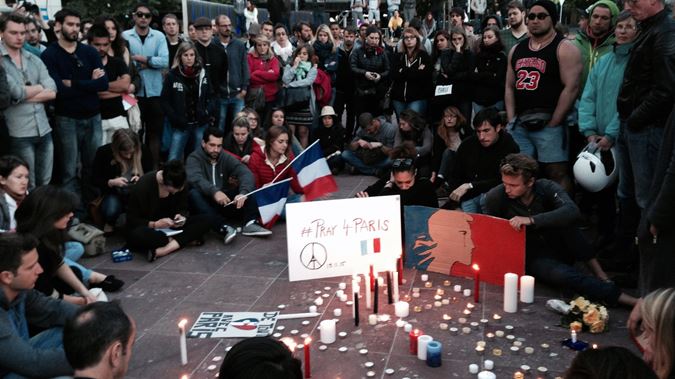Paris Attacks: Why the French Youth?
November 25, 2015
Much of the world news coverage in recent weeks has been focused on the attacks on Paris, attacks that killed at least 130 people and injured over 300 on the 13th. Over the period of a few hours, six coordinated attacks occurred at six locations in Paris, with the most major attacks taking place at a soccer stadium and a concert hall, both attended mostly by young people. The French government has reacted to these attacks with anger, declaring a state of emergency and vowing to fight the groups responsible for the deaths. Other national leaders have declared their support for France — among them President Obama, German Chancellor Merkel, Canadian Prime Minister Trudeau, Russian President Putin, Iranian President Rouhani, and Chinese President Xi Jinping — all expressing their outrage at the killings and sympathies for the French people.
This latest attack stands as the worst terror attack in France’s history, but it is far from one of few. 2015 alone saw six separate events, including the widely-publicized attack on Charlie Hebdo, with deaths totaling at at least 150 (129+ of those a result of the latest event). Many recall the 1980s, a decade in which thirty-five individual terror attacks took place in France attributed to several Middle-Eastern-affiliated groups, including Al-Qaeda and Hezbollah.
These continued attacks on the French people over decades raises a question: why focus on France, and in this case, why Paris? Upon consideration, the most straightforward answer can stem from France’s increased bombing of ISIS’s training camps in response to the foiled attack on a French train in August, a decision the French government expected to incite more terror attacks at home. After taking a closer look, however, it can be seen that the issue of “why” goes much deeper. France has the second-largest population of Muslims in the EU, with French Muslims making up 7.5% of the nation’s population. Such a significant percentage, however, has not guaranteed the acceptance of the group. In fact, the French Muslim and non-Muslim residents have often been at odds with one another. Laws have been passed banning the public use of Islamic religious symbols, the wearing of niqabs and burqas, and public service workers have been called out for acting on prejudices against women choosing to wear hijabs. Many residents of Paris’s banlieues — a name for its suburbs largely dominated by immigrants — report feeling isolated from the city and its community, with Parisians rarely visiting their areas and residents rarely leaving. The existence of these socially-separated neighborhoods has been called a “social frontier”, with residency in them being a serious barrier from employment, and with most inhabitants reporting having had at least one experience with discrimination.
Such commonplace discrimination by the French people has been considered not only a cause of foreign terrorism, but also a significant cause of its homegrown terrorism. It has been estimated that over half the 3,000+ Europeans who left Europe to join ISIS came from France, and there can be no measure of the number of people who, angered by their continued oppression by their own nation, have been radicalized and plan to seek revenge without even leaving the country.
In general, it is true that older generations of people tend to be more prejudiced in this day in age, whereas the youth tend to be more liberal in views. Yet, in the attacks occurring this November, it seems ISIS was specifically targeting young people. Its largest attack of the six was on the Bataclan concert hall, in which a concert for the American band “Eagles of Death Metal” was being held, a concert attended almost entirely by young people. Also attacked was a French soccer stadium, another place commonly inhabited by the younger generation.
It is known that terrorists typically choose their targets based on emotional impact, rather than political importance, as their ultimate goal is to cause fear amongst people. It has been found that in the long-term, traumatic events like these attacks can cause serious psychological damage and instability in the community, which can thus affect businesses and social relations in a population. Many of the French youth who have been interviewed following the attacks have reported changes in their behavior consistent with these studies, with many reporting barely leaving their houses for fear of being victim to another attack. The actions of these attackers, however, despite their desire to get revenge for the constant discrimination they have experienced, have particularly worsened the situation for Muslims living in and around Paris. As reported by one young Muslim woman who wears a veil, the garment “makes me stand out, it makes me obvious. I’m afraid of how people will look at me. But most of all I’m afraid to go into Paris.” The likelihood of even more of this prejudice in the Parisian community, as acknowledged by a non-Muslim French youth, increases with every attack. As she told Newsweek, “For now, people in Paris are standing together, the city is full of love, but what will last will be the racism. What will remain is the fear.”
If anything, the attacks on Paris in November further heighten the need not only to stop ISIS, but to rid nations of their internal prejudices. Regardless of whether they directly contribute to fighting ISIS, many experts have advised nations to work on decreasing racism within their own populations as an effort to prevent the formation of future terrorist groups, and thus to protect the lives of future generations of people.







